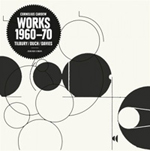|
|
 |
Dusted Reviews
Artist: Tilbury & Duch & Davies Album: Cornelius Cardew Works 1960-70 Label: +3dB Review date: Feb. 25, 2011 |

|
|
|
 |
English composer Cornelius Cardew’s life was cut by short by a hit and run driver in 1981. In his day, he championed and repudiated the avant-garde, improvised with AMM and played Maoist music-hall songs for the people (who, judging from record sales, preferred Peter Frampton and Fleetwood Mac). Who remembers him now? His old AMM mates; percussionist Eddie Prévost’s Matchless Recordings continues to publish and record his music, and pianist John Tilbury has written an 1,100-page biography of the man. He is also an example to a younger generation in tune with his determination to align musical and political practice; Mattin, for example, named one of his provocations after Cardew’s renunciation of Karlheinz Stockhausen.
But if you’re expecting laptop noise, or even the more hardware store-based variety he played on AMM’s first album, let alone communist sing-alongs, you’re in for a shock. Performed on piano, double bass and concert harp, it’s chamber music — chamber music that’s quite lovely in its own severe fashion. But no matter what Cardew did throughout his career, he did it with an awareness of its ethical and political implications. These pieces come from an era when the control that conductors and composers exercised over musicians came under critical scrutiny as part of a larger challenge of authoritarian practices.
“August 1960” takes its cue from John Cage, who played piano on its first performance, by undermining the assuredness of the score. Cardew’s manuscript contains contradictory instructions for every beat, thereby permitting the players to negotiate each point of contention. Now that contemporary classical repertoire is a bit more open, the political implications of the piece carry less charge. But since the instructions open the music up to possibility, there’s always room for another performance. Sparse and deliberate, this one is an antidote to the information age. Each note and gesture stands in sharp relief upon a field of silence, permitting the listener to savor their full import before another sound asks for their attention. “Material,” on the other hand, applies a myriad of responses to a small serving of material by playing numerous subtle variations on three-note segments. Again, the musicians get to make choices about how they vary their approach, but the music never feels like an exercise. John Tilbury, now 74 years old, has published an in-depth biography of Cardew and performed his music for his entire adult life, and every note he plays feels enriched by immersion and consideration. Michael Duch and Rhodri Davies also treat it as music encoded with a myriad of meanings. There’s tension within and between each iterated cell; although the individual sounds seem to hang suspended, there’s nothing remotely drifty or diffuse about the piece.
“Treatise” is a 193-page, word and note-free graphic score. It requires performers to think of shape and proportion, and of their actions as part of a whole that is not completely sounded or heard. The musicians may have freedom in interpreting the piece, but it sounds nothing like improvised music. The excerpt performed here has an exacting sense of balance, so that the volume of each key-strike or string-groan feels like a highly specific expression that is essential to an immense narrative. “Unintended Piano Music,” on the other hand, seems to suspend a single moment by spreading a phrase that could be played on the keyboard across the registers of three instruments. The harp is like a far-flung right hand, and the bowed bass seems to ooze out of the low piano notes. It feels like a refraction of something that Tilbury might play with AMM, but broken out of context and left to hang on its own, perfect and complete.
By Bill Meyer
|







